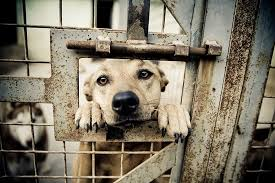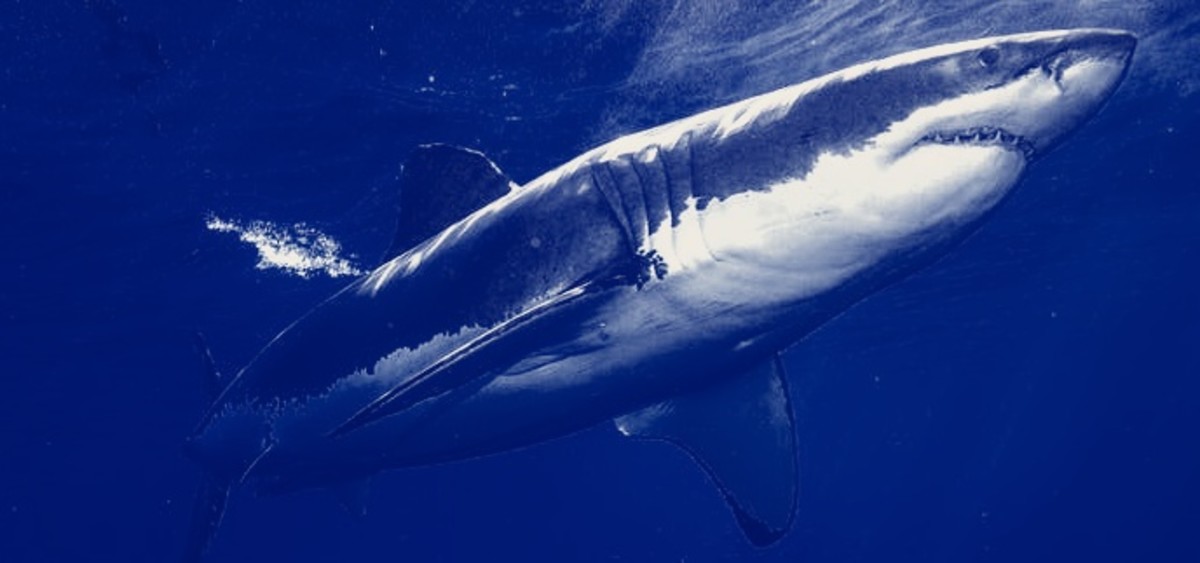Why "No-Kill" shelters are no good

Understanding No-Kill
Here's the thing, most people love animals, and want what's best for them. However, what we as humans think is best for them, isn't always truly what's best. Anthropomorphism is reaching unbearable peaks over the past decade or so, with people attributing human psychology to animals as we become a more pet-obsessed society. And while many people would think there's nothing wrong with that, a true animal lover understands otherwise. Humans have an innate will to live and thrive. We assume animals do as well. But, this isn't always the case. "No-kill" sounds great. Save them all! Well that isn't a reality that's either feasible nor is it always what's really best for some animals.
Most people think that a no-kill shelter is a place where homeless, abandoned, or unwanted pets, if not adopted, live the remainder of their lives happy in the fact that they have been saved from the grips of the needle. In reality, it's not the case. In the US, we actually only have a handful of completely no-kill shelters. Many shelters call themselves "no-kill", but aren't operating in the manner in which the general public believes them to be. Most no-kill shelters in name only, still euthanize sickly animals, animals regarded as aggressive and dangerous to the public, and animals considered to be "unable to be rehabilitated". All three of these stipulates are open to interpretation, and vary from shelter to shelter. One shelter may take a dog that has to undergo extensive, painful surgery, and decide that for health reasons, the dog must be euthanized, while another might take that very same dog, and say it's got a fighting chance at life, and is therefore reprieved from the death sentence. You see, "no-kill", doesn't have to mean that every animal will live in order for them to call themselves no-kill. And that's where the general public is mistaken on the majority of "no-kill" shelters. There are a handful of genuine "no-kill" shelters throughout the country, but not many, contrary to popular belief.
Also, something most people aren't usually aware of, is that many true "no-kill shelters", are places where animals live in cramped, confined spaces, not being given the appropriate amount of space needed for that animal. They are often understaffed, and over budget, causing many animals to live substandard conditions, where illness runs rampant. Dirty, smelly cages with several animals confined to a single cage or kennel, malnourished animals fighting with kennelmates for food. It's not the wonderful, ideal place that many people think it is, or that is sometimes seen on tv.

Understanding animals
With that misconception dispelled, we need to move on to the meat of this debate. What's truly best for these animals. Every pet that comes through a shelters doors, shouldn't be sentenced to a life of misery simply because it makes us as humans feel better, feel as though we are doing something good for these animals. It's actually pretty selfish.
There are a large variety of reasons that humane euthanization of shelter animals is important. We so badly want to attribute human feelings and emotions and reason to these innocent animals, that we often look past what they really are feeling. Animals have feelings. Animals do not however, have the feelings we often like to attribute to them. One of the most popular pieces of rhetoric articulated by avid no-kill supporters, is the assertion that "every animal has the right to live", and "every animal wants to live". Also ironic in that a large portion of these people are fully supportive of abortions of human beings, which is the highest form of hypocrisy I can think of, but that's for a different debate, (and is not the stance that every no-kill advocate has, just a seemingly large portion). But here's the thing; animals are not human. Animals do not possess the faculties that humans do in most areas. Animals rely on instinct. They can love, be happy, be hurt, but they cannot reason. Animals do not sit and think; "oh the things I want to do before I die", " "I want to live a long life and not have it cut short". Animals do not reason in that way, they simply do not. Relying on instinct is what mother nature (well actually God), gave to animals. When an animal is ready to die, they instinctually shut down, they relinquish life not knowing there are "missing out" on life.
Attributing human emotions and thought processes in animals is a big problem. We have seen it reach it's unbearable climb over the past 2 decades or so. People have become so enthralled with animals and have such a deep love for them (which is totally understandable), that they have turned to thinking of them more as humans than as animals. 60 years ago, pets weren't thought of as emotional beings, they were thought of as animals in the true sense of the word. And the reason this is such a problem, is that it actually can be to the detriment of the animal. It's really important that we distinguish the reality of how animals live, as opposed to thinking that they have the same emotional and psychological attributes that a human does, and I cannot stress this enough. It can lead to the suffering and unhappiness of the animal in some cases.

Understanding the issues
Animals, especially domesticated ones like cats and dogs, have a need for companionship, be it with other animals, or with people. And that's important to remember when considering the topic of no-kill. So, it's better to leave an animal to languish in a crate or kennel for the remainder of their lives, getting a relatively small amount of human interaction, as compared to animals that have homes? It's not. We feel good because we are "saving a life", when in reality, if that animal is never adopted, we are sentencing it to a life of loneliness and confinement. Sure, they get taken out for walks sometimes and have some interaction with people when being fed, having their kennel cleaned, or being visited by a volunteer, staff member, or potential adopter. But that that's about it. It's innate within and animal want freedom. They like to explore, play, find companionship, and live the life that their species typically enjoy. Animals do not think; "I'm so glad that I'm given the opportunity to live out the rest of my life, rather than be euthanized and miss out on a life of solitude in a cold metal cage". There are some places, albeit very, very few, that enable the animals (usually cats), to live out their life free to wander the grounds of the sanctuary they've been taken to. Cat sanctuaries allow cats, often feral ones, to enjoy the life of a domestic cat, like any other. Wonderful in theory, however due to the sheer number of cats in need of homes, combined with the high cost to operate such an establishment, make for very few of these types of sanctuaries. Typically, cats in no-kill shelters, live in a small metal kennel, with just enough room for their litter box and a small bed. That's not an enjoyable life for a cat. Keeping an animal at a shelter for 6 months in the hopes that they will eventually be adopted is one thing. It's quite another for them to languish in a shelter for 10 years.
Then we take a look at sickly animals. If a dog comes in with a broken bone that can be fixed, then by all means, get it done. But when some animals are brought into true-to-the-name no-kill shelters, they are very, very ill or injured. It's no-kill, so the dog that's in immense pain, dying a slow death from cancer, won't be euthanized? Why not?! Here's where attributing human emotions to animals gets us in trouble again. The humane thing is to euthanize the dog, not to pump it full of pain meds each day, put it through chemotherapy and lengthy surgeries. It's cruel. But some people don't see it that way, because they are blinded by their mission to save every animal, no matter the cost to that animal. It makes people feel good inside to know they have saved an animals life. Meanwhile, the poor animal is suffering, in pain, and it's instincts are let go of life, and pass on. The greatest gift we can give them, is to humanely euthanize those animals that are very sickly, or horribly injured. Pets aren't people.
Then there's perhaps the most controversial aspect of no-kill; Aggressive animals. Animals that cannot be adopted because they are too dangerous, are proven "biters", and pose a real threat to public safety. Generally speaking this topic revolves around dogs for the most part, though there are cats that can be endlessly hostile and refuse any type of human contact, and won't hesitate to bite or scratch if you so much as walk within 50-feet of them. There are a variety of factors that go into play when deeming a dog as too dangerous to be adoptable. The size of the animal, the breed, it's propensity to bite, and how many times it's attacked in the past. When you have a 75 lb. dog, that has attacked in the past, and is genetically programmed to do as much damage as possible when it does bite, it needs to be euthanized. This debate spills over into another argument altogether about dangerous dog breeds and biases of certain breeds vs. protecting human life. That's a whole different article. So without inciting anger in people, I'll just say that some dogs should not be adopted out, and that includes dogs of any breed, if the dog is very aggressive. And when a dog is a danger to humans AND OTHER ANIMALS, euthanization is unfortunately the best choice. Everyone's definition of "too aggressive" is different, and therein lies the rub. One persons opinion on whether a certain dog is too dangerous to adopt out is different than someone else's. If a professional evaluator deems a dog "too dangerous", then I'd say that would be the determining factor. Keeping a dangerous dog in a small kennel for the rest of it's life, is not only not fair to that dog, but a danger to shelter staff, volunteers, the public and other animals. And the longer that dog is caged, the deeper the aggression grows. Meanwhile, tons of friendly, adoptable dogs are being turned away because of budget and space restraints, in order to keep an animal languishing for years, that is miserable and aggressive....just so we can say "we saved him!" and ease our conscience.
I think the one argument that "no-kill advocates" love to use in their propoganda that irks me the most, is the (completely misguided) analogy "would you kill a child that didn't have a home?" When you start implying that human life is equal to that of an animals, you've done a swan dive off the cliff of reality, into a world where sanity is no longer present. Why on earth would you compare a cat to the life of a human child? They will try to gaslight you at this stage of the argument, making it look as though you're crazy for thinking that human life should be looked at as being above that of any other type of living creature. "All life is precious", that's the standard response. Yep, it is. But that in no way means a cat should be afforded the same dignities and accommodations that a human should have. You can love animals and believe that killing an animal for no legitimate reason is wrong, and still understand the reality that a human child's life isn't equal to that of a dogs. Paralleling children's lives with that of animals is a feeble attempt at justifying the "save all animals no matter what the cost" mindset that many no-kill advocates have. It just doesn't wash.
Inevitably, the reality of funding comes into play within this debate. Yes, it would be great if we had endless gobs of money to create animal sanctuaries on every street corner in order to save every last animal. But we don't, we never will. Many people don't like factoring money into the decision of whether an animal should live or die, because it can feel as though we are putting a value on the life of animals. We all know that what animals do for us as a whole, is priceless and can never be measured in dollars and cents. But when harsh realities of life come crashing through the door, the bottom line is that we do have to prioritize where the money goes. The objective of no-kill, is so save animals lives. We are speaking about animals that will otherwise have nowhere else to go. Rather than soaking money into making sure that an unadoptable dog can languish in loneliness in confined quarters for 10 years, we could be putting that money into funding low/no cost spay/neuter programs. The amount of money spent keeping one dog alive in a no-kill shelter for several years, could actually save hundreds of animals from being homeless by spaying/neutering a pet that would otherwise not be fixed due to income restraints of the owners of these pets. Don't get me wrong, I'm not one of those neuter Nazi's that think breeding is wrong and that every time a puppy is born, one more dies in a shelter. I am a big supporter of responsible breeding. But there are many, many situations where a pet breeds for no other reason than the fact that the owners of that pet could not afford to have it spayed or neutered. They don't want to breed, they have no intention of breeding their pet, but if you know anything about animals, you know that a dog or cat that's in heat, will find her way to an anxious male that smelled her hormones from miles away. So, it comes down to basic math; Take limited funds and "save" one dog, or save hundreds. It's not a difficult choice.
Again, the focus on understanding that animals are night humans, do not think like humans, do not reason like humans, and do not have the same instincts as humans is an extremely important factor here. When you start attributing human emotions to animals (which is rampant these days), you're doing them a great disservice. Being an animal lover, and one that advocates for animals, means not being blinded by rhetoric, propaganda, and emotions. To be the most effective in doing what's best for animals, we have to understand the differences in humans and animals, and work from what's best for them, not what we think as humans would want, or from a place that makes us feel warm and gooey inside without regard for what's best for them.









